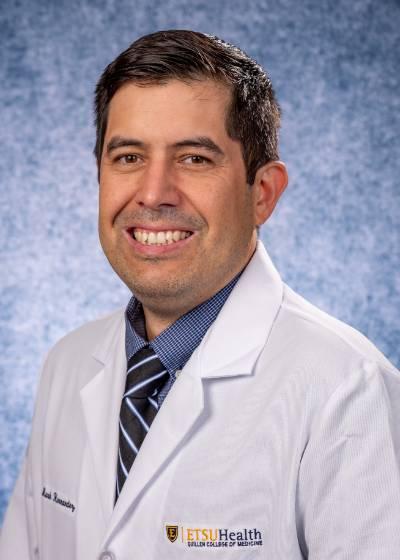Medical research is a vital part of the mission at the Quillen College of Medicine. Our scientists are actively researching the biological bases of medical and psychiatric disorders that reduce the quality of life of the people of our region and beyond. The faculty, staff and students of our institution are expeditiously engaged in research to develop novel treatments and cures for numerous disorders and diseases. QCOM scientists engage in research on a wide variety of medical research problems, but areas of particular focus include disorders that affect the cardiovascular system, the immune system, and the nervous system including the brain.
Another often overlooked yet critically important aspect of research at Quillen is its contribution to the education of our students. Through exposure to and engagement in our research programs, students (undergraduate, graduate, and medical students) develop their critical thinking skills, improve their ability to communicate scientific information, build self-confidence, and learn to question “medical dogma”. These important skills help them become better health professionals.
Congratulations to the Recipients of the Quillen Research Enhancement Grant Awards!

Brooke Schmeichel, Ph.D., Principal Investigator, Department of Biomedical Sciences
Project Title: A novel approach for a preclinical model of methamphetamine dependence using electronic-vapor technology: a translational tool for addiction research
Proposed Research Project: The widespread use of e-cigarette technology, or vaping, has rapidly escalated into a significant health concern not only for nicotine addiction but also for other drugs of abuse, such as the synthetic stimulant methamphetamine. The intersection of vaping and drugs of abuse poses a complex challenge for understanding their combined health effects. Our proposed preclinical studies investigating drug taking behaviors and long-term consequences of vaporized drug exposure are essential to inform public health strategies, guide regulatory policies, and develop effective clinical interventions to mitigate the risks associated with substance use and addiction in diverse populations.

Valentin Yakubenko, Ph.D., Principal Investigator, Department of Biomedical Sciences
Project Title: The development of experimental approaches to study the mechanism of macrophsage retention
at atherosclerotic lesions
Proposed Research Project: In this proposal we will test a hypothesis that inflammation-mediated oxidation of different polyunsaturated fatty acids (such as arachidonic, linolenic and docosahexaenoic acids) generates a unique adhesive substrate in the vascular wall for the robust adhesion of macrophages by the formation of new ligand-receptor pair: carboxyalkylpyrroles-modified extracellular matrix proteins - integrin αDβ2), which is critical for macrophage retention during atherosclerosis. The successful completion of our project will provide a new strategy for treating atherosclerosis and will serve for the development of a powerful inhibitor of macrophage retention during atherogenesis.
Award Amounts $25,000
Congratulations to the Recipient of the Quillen Scholarship Enhancement Grant Award!

Dr. Mark Hernandez
Principal Investigator, Department of Medical Education
Project Title: Incorporation of AI Modalities and Tools into IQ Problem-Based Learning
Proposed Research Project: On November 30, 2022, OpenAI introduced ChatGPT, marking a significant shift in the integration of Artificial Intelligence (AI) into everything including medical education. This integration is rapidly reshaping the landscape, presenting both opportunities and challenges. The Quillen Scholarship Grant will fund a 3-month subscription to AI tools for all first-year medical students. This initative offers a valuable chance to democratize access during IQ (PBL), gain hands-on experience with AI, and inform faculty facilitators. Faculty serving as facilitators will also learn how students utilize these AI tools.
Award amount $6,040
ETSU Research Facilities
Seminars
College of Medicine
- Department of Biomedical Sciences Internal Seminars
- Department of Biomedical Sciences External Seminars
College of Arts & Sciences/College of Public Health
 Steam/Natural Gas Service Dis...
Steam/Natural Gas Service Dis...  Stout Drive Road Closure
Stout Drive Road Closure